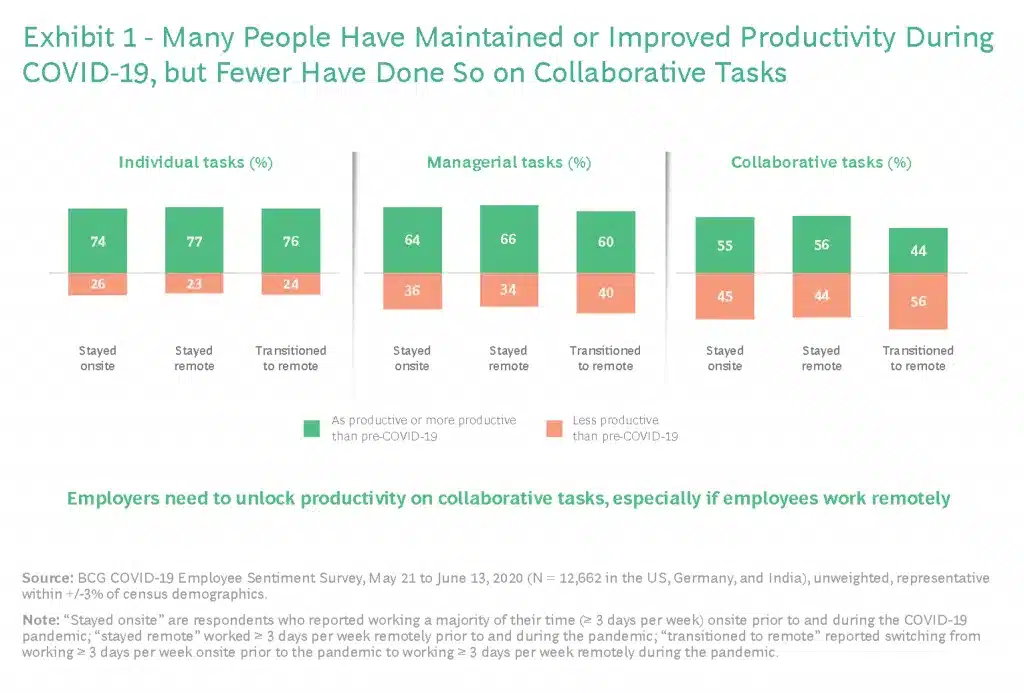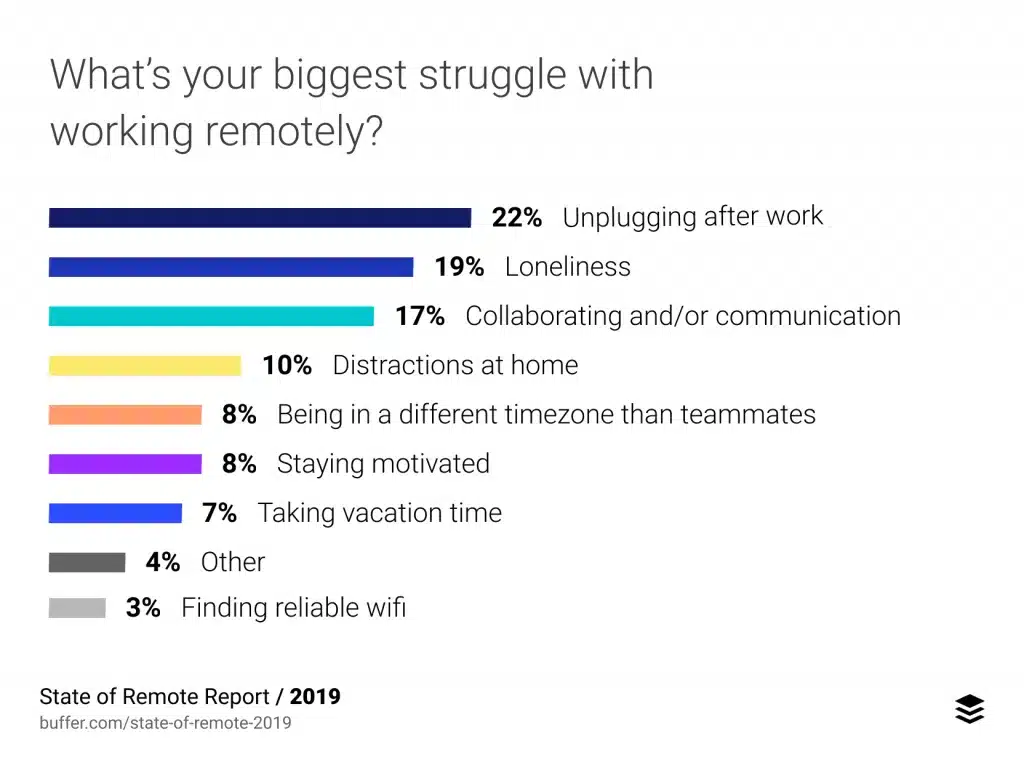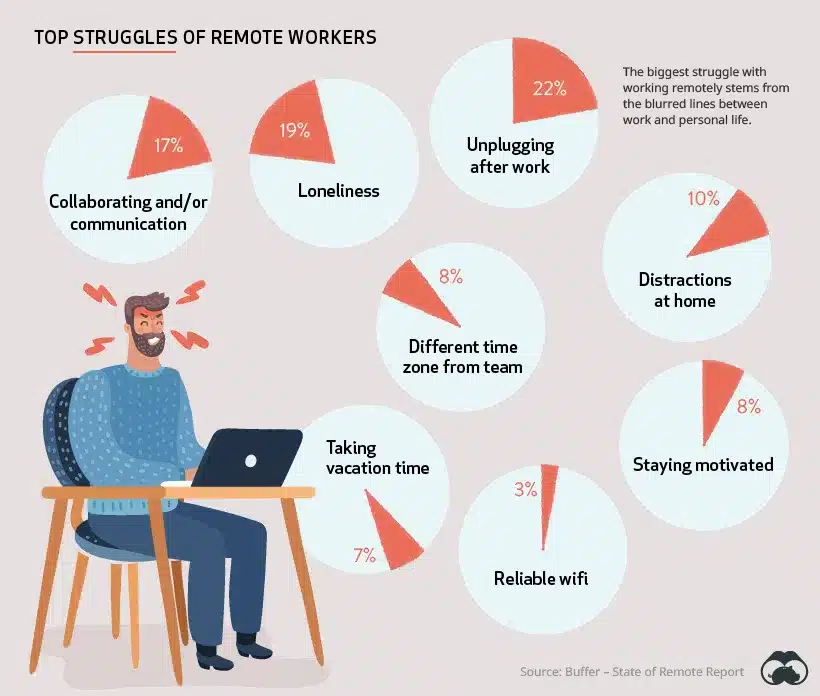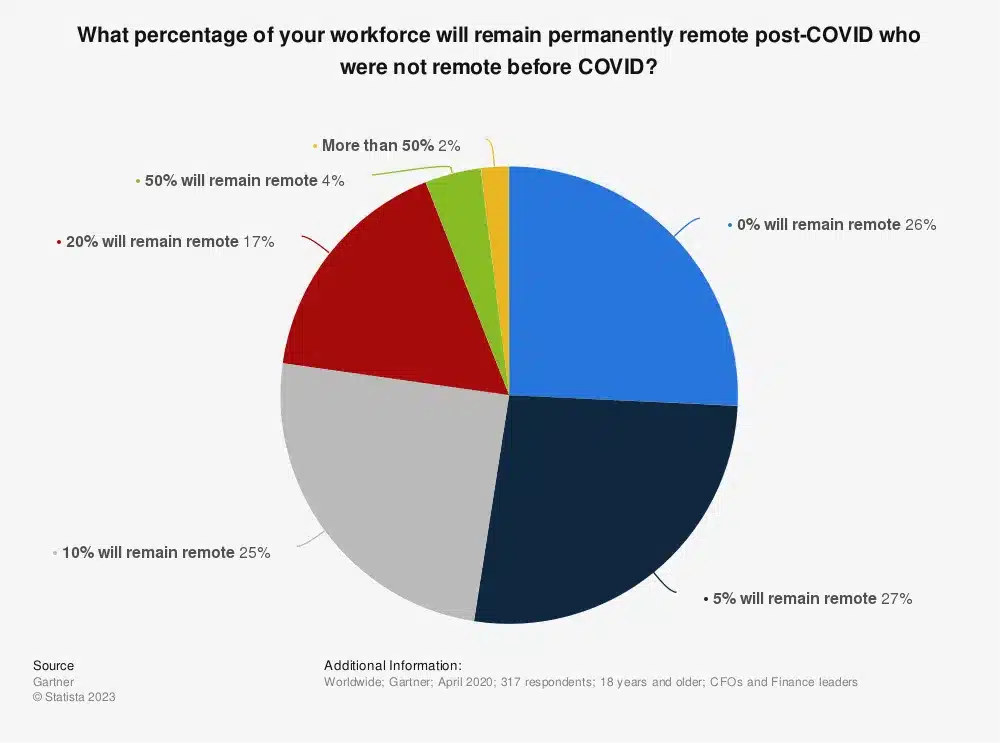As the CEO of your company, are you conflicted about work from home productivity? Does your organization contribute as much?
A recent study, states that Covid19 has shaped the way we do work. The study finds a surge in the adoption of remote work with 67% of enterprises opting to ‘keep it this way’.
But is remote working good for your business? Does it increase or decrease productivity?
If you are looking for answers to these questions, you have come to the right place.
What does productivity mean?
To understand productivity, we need to look at the different factors that influence productivity
If your remote employees feel motivated and engaged, they will align to the organizational values and hence be more productive.
In an office setup, it is easier to turn your chair around to engage with an employee. It’s easier to maintain social-currency with meetings and fun activities at the office. It’s easy to look at an employee, in person and gauge if they are drained or disconnected. But the pandemic has dictated new rules of working together
However, remote work, especially in the current times of ongoing pandemic, has dictated new rules of working.
Hence, as a business leader, you tend to wonder if in a remote set up your team is:
- motivated,
- engaged,
- and consequently productive.
Myths About Working from Home & Productivity
As the business leader new to the work of remote working, it is easy to fall prey to various myths and misconceptions of working from home.
Let us take a look at some of the common myths.
Myth: Employees are just passing their time
When employers cannot see the employees working, they might assume the employees to be present online, but at the same time not focus on work, getting distracted by household chores or televisions or something else.
A common fear that employers have is of the employees missing deadlines and not managing time properly.
Truth: Remote employees have no qualms about working long hours as per the study conducted by Owl Labs. 43% of remote workers work longer than their counterparts.
Myth: Employees are taking frequent breaks
Remote work allows the employees to work from home and employers often conclude that employees may be taking breaks frequently, affecting their work quality and productivity.
But then it is also possible that employees cannot balance life at home and spend too much time working, which could eventually lead to burnout.
Truth: However, according to remote work statistics, 37% of remote workers say the best way to boost productivity is to take regular breaks.
Prevent Isolation & Reduce Burn-out
Send your remote teams for virtual coffee and help them know more about each other with Rapid-fire quiz and interesting ice-breakers.
Easy to Implement Virtual Coffee Software for Remote Teams
CoffeeConnect automatically connects two people every week based on their interests in slack and helps them build camaraderie easily with ice-breakers questions and rapid-fire quizzes.
Myth: Employees are not collaborating enough
When an employee does not respond promptly to emails or chat messages, his communication may seem infrequent – a symptom that can be misunderstood as a sign of weak collaboration and reduced productivity.
For decades, organizational teams have been collaborating across geographies. But when a co-located team begins to work remotely, there could be issues in teamwork. How does one replace a meeting room and a white-board?
Truth: According to BCG, 56% of all respondents said they have been able to maintain or improve their productivity working remotely with other team members.

Myth: Employees are not able to focus
Office spaces created a social zone with a focus on the company-related task. Closed environments worked because they cut employees from their potential distractions, hence making them more productive.
Without a private space, it is difficult to understand if the remote employee is distracted. There could be family distractions or personal distractions. There is no definitive way to understand if the home setup is not allowing the remote employee to focus.
Truth: However, a survey by Flexjobs indicates that 75% of people who work from home do so because there are fewer distractions
These myths point to one common myth – that the employees are not productive enough.
Realities of working from home productivity
While some are myths, there are some realities too which make productivity while working from home challenging
1 Not meeting each other every day
Generally, the work-culture dictates bonding with each other. A part of the work-culture is to meet, discuss work and non-work-related issues. With the physical distance, work coordination and engagement is thwarted.
The BCG survey, also indicates the same, about more than 70% of the respondents felt that they were less productive due to social connectivity breakage.

2 Isolation & loneliness
With a lack of outside interaction, especially with lockdown due to a pandemic, employees are blocked from the world. There is a lack of human connection, thus inducing the feeling of isolation and loneliness.
While some feel that working in isolation is bad for productivity, others may be more productive.
Isolation and loneliness affect mental health which affects employee motivation—lack of motivation further affects productivity.
According to a survey by Buffer, 19% of remote employees report loneliness as their biggest challenge.

Prevent Isolation & Reduce Burn-out
Send your remote teams for virtual coffee and help them know more about each other with Rapid-fire quiz and interesting ice-breakers.
Easy to Implement Virtual Coffee Software for Remote Teams
CoffeeConnect automatically connects two people every week based on their interests in slack and helps them build camaraderie easily with ice-breakers questions and rapid-fire quizzes.
3 Lack of proper communication
Think of the one on one meetings, where body language is also a part of communication. Without being face-to-face physically, it is difficult to gauge the other person’s non-verbal signs.
The same is valid for team synergy. With the dependency on team members to complete a task, not communicating enough or misinterpretation of emails can imply conflict. Hence over communication gives way to proper interaction in a remote work setup.
In research, 27% of the remote employees have cited communication as their #1 issue.
It is so much easier to walk to a colleague and ask a work-related doubt. It is also more comfortable to attend an office meeting in person while providing feedback.
While working remotely, even simple doubts, take the shape of a meeting. It makes tasks challenging to execute.
According to a report, the #2 challenge with the meeting, stayed engaged. And the #1 challenge with 31 % indicated audio/video issues, which leads to a waste of productive hours.
5 Uncertainty
With an increase in the number of Covid-19 positive cases, businesses are operationally challenged affecting their revenue. On the one hand, everyone is worried about getting infected on the other losing their job.
No one wants their role to be redundant. With no company growth, remote employees are more concerned about their future, which further deteriorates their productivity.

Pandemic or not, according to a survey, more people feel the blurred lines between work and home beyond just the uncertainty of the pandemic.
6 Mental Wellness
While distances make relationships grow fonder, in times, where everyone is locked at home, working away from home, makes an employee anxious about the health of the family member.
On the other hand, living in isolation stresses the employee impacting mental health.
Will an employee be able to function when his world is falling apart?
Hence according to a survey, 51% of the businesses are offering mental health support for the remote workers.
Prevent Isolation & Reduce Burn-out
Send your remote teams for virtual coffee and help them know more about each other with Rapid-fire quiz and interesting ice-breakers.
Easy to Implement Virtual Coffee Software for Remote Teams
CoffeeConnect automatically connects two people every week based on their interests in slack and helps them build camaraderie easily with ice-breakers questions and rapid-fire quizzes.
How have companies overcome working from home productivity challenges?
There are a lot of issues with remote work and the problems they bring forward to remote management. Although remote work has its set of challenges to be dealt with, some benefits make it the most productive setup for your team. that working from home increases productivity
According to a survey by S&P Global Market Intelligence, is that 80% of organizations that said they have employed expanded or universal work-from-home policies.
Twitter has announced that its employees can continue to work from home permanently.
Other tech giants like Google and Facebook have said they will operate at around 30% of office capacity, with most workers allowed to work from home through 2020.
If there are drawbacks to remote work, then how are businesses able to transition successfully?
Pandemic forced the organization to adopt a remote working culture. Using digital technology—tools like Slack, the Zoom, WebEx, EverNote has made working from home possible.

There is also a considerable shift in the mindset of managers, especially with conveying trust, patience and accountability.
This translates to building a cohesive work culture and making sure that there is constant clear communication from management regularly.
While organizations can develop policies and culture, eventually, it all narrows down to how individuals work together.
According to Statista, 25% of respondent companies will move 10% of their employees to permanent remote positions post-COVID 19.

Remote jobs like these can be a reality with a smooth transition.
Many companies like Buffer, Stripe and Github already had an organizational structure with just remote workers. The external push of pandemic has forced a few organizations to transition to a work culture of remote workers.
Let’s take a look at some well-known companies who have adapted to the remote work culture and are happy with the productivity of their employees as they work from home.
1 Facebook
“We’re going to be the most forward-leaning company on remote work at our scale. We need to do this in a way that’s thoughtful and responsible, so we’re going to do this in a measured way”—Mark Zuckerberg.
When Blind surveyed the social media company, about 15% said they would never go to an office while 15% suggested that they would like to work from the office daily. This is also possible because of an individual accountability environment.
In aggregate, many companies could find their offices more than half empty most of the time after the crisis abates.
2 Cisco
Fran Katsoudas, Cisco’s chief people officer, was quoted as saying by NYTimes “We’re seeing an increase in productivity.”
Most of Cisco’s employees have been working from home productively for months, and their internal data shows many were accomplishing more.
According to the company’s tracking, customer service representatives are taking more calls, and customers are more satisfied with the help they receive, 25% of respondent companies will move 10% of their employees to permanent remote positions post-COVID 19.
For Cisco, their in-house collaborative tools like Web-Ex help fuel the transition. Cisco re-defined its policies and processes with the remote work culture in mind.
3 Microsoft
One of the benefits that companies lure their employees to is their office space and amenities. So then it makes sense when the giants are worried about burning social capital because of remote work.
NYTimes quotes Satya Nadella of Microsoft pondering about the company’s improved efficiency: “How long lasting is that? What does burnout look like? What does mental health look like?”
Microsoft evaluated the needs of employees, customers and partners before creating their remote work constitution. They ensured that the customers have enough tools and access to combat the COVID-19 situation.
Summing up
Benefits of remote work are many, and an increase in working from productivity is just one. If you are contemplating going remote, trust is the key to unlock the success of your remote teams.
Related reading: How to build trust with your remote teams?
With digital evolution, the growth of remote work was inevitable, the pandemic only accelerated the move. There is no denying that the remote work is the future of work.







